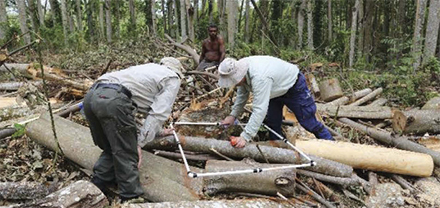
The balsa export industry in the East New Britain Province (ENB) of Papua New Guinea (PNG) is big business. Despite this, it faces major challenges with productivity and sustainability, market access and product development. Australian researchers have taken initial steps to work with industry stakeholders to change all of this. Source: Timberbiz
The project, supported by the Australian Centre for International Agricultural Research (ACIAR), saw Australian and PNG based researchers work in collaboration with the ENB balsa industry to look at addressing some of the common challenges they face.
These include poor plantation productivity and sustainability, market access in the context of forest certification and legal verification, and a lack of product development and diversification.
Balsa is grown as a plantation crop by companies and smallholders across ENB, forming an industry that produces 9% of the world’s processed balsa.
Around 1500 ENB smallholders grow balsa, with a local workforce of between 2500 and 3000 employed in the harvesting, transportation, processing and exportation of the material.
Regulation is under the remit of the PNG Forest Authority, which plays an ‘honest broker’ role in transactions between processing companies and smallholders.
The recent joint research approach comprised surveys of the sector, silvicultural experiments, testing of genetic resources and considerations around product development.
Key outcomes of the research included:
- Establishment of a ‘smallholder friendly’ silvicultural regime that removes the need for thinning or refilling
- Integration of an updated Balsa Manual into an existing ENB agricultural training program
- Development of new balsa panel products that are particularly suitable for apartment interiors.
The research also facilitated the adoption of certification in the ENB balsa sector and identified targeted regulatory reforms that are required to support the continuing development of the industry.





